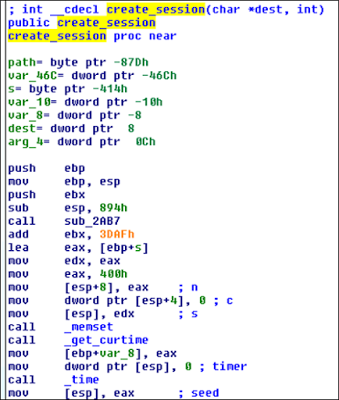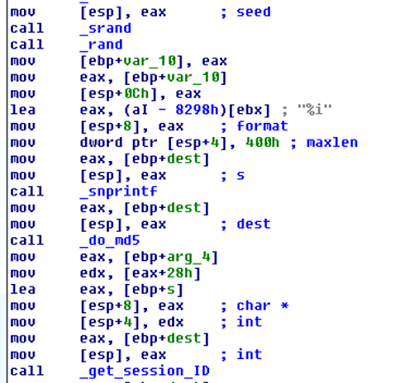Vulnerabilities > CVE-2016-8584 - Improper Access Control vulnerability in Trendmicro Threat Discovery Appliance 2.6.1062
Attack vector
NETWORK Attack complexity
LOW Privileges required
NONE Confidentiality impact
HIGH Integrity impact
HIGH Availability impact
HIGH Summary
Trend Micro Threat Discovery Appliance 2.6.1062r1 and earlier uses predictable session values, which allows remote attackers to bypass authentication by guessing the value.
Vulnerable Configurations
| Part | Description | Count |
|---|---|---|
| Application | 1 |
Common Weakness Enumeration (CWE)
Common Attack Pattern Enumeration and Classification (CAPEC)
- Embedding Scripts within Scripts An attack of this type exploits a programs' vulnerabilities that are brought on by allowing remote hosts to execute scripts. The attacker leverages this capability to execute scripts to execute his/her own script by embedding it within other scripts that the target software is likely to execute. The attacker must have the ability to inject script into script that is likely to be executed. If this is done, then the attacker can potentially launch a variety of probes and attacks against the web server's local environment, in many cases the so-called DMZ, back end resources the web server can communicate with, and other hosts. With the proliferation of intermediaries, such as Web App Firewalls, network devices, and even printers having JVMs and Web servers, there are many locales where an attacker can inject malicious scripts. Since this attack pattern defines scripts within scripts, there are likely privileges to execute said attack on the host. Of course, these attacks are not solely limited to the server side, client side scripts like Ajax and client side JavaScript can contain malicious scripts as well. In general all that is required is for there to be sufficient privileges to execute a script, but not protected against writing.
- Signature Spoofing by Key Theft An attacker obtains an authoritative or reputable signer's private signature key by theft and then uses this key to forge signatures from the original signer to mislead a victim into performing actions that benefit the attacker.
Packetstorm
| data source | https://packetstormsecurity.com/files/download/142227/tmtda261062rl-bypass.txt |
| id | PACKETSTORM:142227 |
| last seen | 2017-04-20 |
| published | 2017-04-20 |
| reporter | Roberto Suggi Liverani |
| source | https://packetstormsecurity.com/files/142227/Trend-Micro-Threat-Discovery-Appliance-2.6.1062r1-Session-Generation-Authentication-Bypass.html |
| title | Trend Micro Threat Discovery Appliance 2.6.1062r1 Session Generation Authentication Bypass |
Seebug
| bulletinFamily | exploit |
| description | In the last few months, I have been testing several Trend Micro products with Steven Seeley ([@steventseeley](https://twitter.com/steventseeley)). Together, we have found more than 200+ RCE (Remote Code Execution) vulnerabilities and for the first time we presented the outcome of our research at [Hack In The Box 2017 Amsterdam](https://conference.hitb.org/hitbsecconf2017ams/sessions/trending-a-micro-line-how-we-found-over-100-rce-vulnerabilities-in-trend-micro-software/) in April. The presentation is available as a [PDF](http://conference.hitb.org/hitbsecconf2017ams/materials/D1T1%20-%20Steven%20Seeley%20and%20Roberto%20Suggi%20Liverani%20-%20I%20Got%2099%20Trends%20and%20a%20%23%20Is%20All%20Of%20Them.pdf) or as a [Slideshare](https://www.slideshare.net/robertosl81/i-got-99-trends-and-a-is-all-of-them). <iframe allowfullscreen="" frameborder="0" height="470px" marginheight="0" marginwidth="0" mozallowfullscreen="" scrolling="no" src="https://www.slideshare.net/robertosl81/slideshelf" style="border: none;" webkitallowfullscreen="" width="615px"></iframe> Since it was not possible to cover all discovered vulnerabilities with a single presentation, this blog post will cover and analyze a further vulnerability that did not make it to the slides, and which affects the Trend Micro Threat Discovery Appliance (TDA) product. **CVE-2016-8584 - TDA Session Generation Authentication Bypass** This was an interesting vulnerability, discovered after observing that two consecutive login attempts against the web interface returned the same session_id token. Following this observation, our inference was that time factor played a role. After further analysis and reversing of the TDA libraries, the session management was found to be defined in the following library: /opt/TrendMicro/MinorityReport/lib/mini_httpd/utils.so Within this library, the create_session() function is of particular interest, as shown below.   This function performs the following actions: - Gets current time - Use time as “seed” - Use srand() with above seed - MD5 hash the rest All these functions can be shortened as the following: _session_id = md5(srand(get_curtime()))_ The vulnerability is that the seed is predictable, and therefore an attacker can generate session IDs issued in the past. However, there are two conditions which affect exploitation of this vulnerability: 1) A legitimate user has to be authenticated - a session token is associated with an IP address when a user logs in 2) Attacker needs to perform the attack with the same IP address of legitimate user The second condition is not an issue in a NATed environment but in a different environment it's definitely the most significant constraint. A further conclusion is that although the attacker is able to technically predict "future" session_id tokens, there is no point in doing that, since condition (1) has to be to met first and an association between an IP address and session_id has to exist in the database. The exploit Proof-of-Concept (poc) has been published [here](https://gist.github.com/malerisch/0b8ecfcb03a2c2f26e5f649cf1df8d33) and below a video showing the attack in action: https://www.youtube.com/embed/rwmfbvvGHDw The exploits for all the other TDA vulnerabilities that were discovered as part of this research can be found below: [CVE-2016-8584 - Trend Micro Threat Discovery Appliance <= 2.6.1062r1 (latest) Session Generation Authentication Bypass Vulnerability](https://gist.github.com/malerisch/0b8ecfcb03a2c2f26e5f649cf1df8d33) [CVE-2016-7547 - Trend Micro Threat Discovery Appliance <= 2.6.1062r1 dlp_policy_upload.cgi Information Disclosure Vulnerability](https://gist.github.com/malerisch/b8764501d299f2ec9eb145258d404e5f) [CVE-2016-7552 - Trend Micro Threat Discovery Appliance <= 2.6.1062r1 logoff.cgi Directory Traversal Authentication Bypass Vulnerability](https://gist.github.com/malerisch/5de8b408443ee9253b3954a62a8d97b4) [CVE-2016-8585 - Trend Micro Threat Discovery Appliance <= 2.6.1062r1 admin_sys_time.cgi Command Injection Remote Code Execution Vulnerability](https://gist.github.com/malerisch/91239147d4fceffa63006974889ef1af) [CVE-2016-8586 - Trend Micro Threat Discovery Appliance <= 2.6.1062r1 detected_potential_files.cgi Command Injection Remote Code Execution Vulnerability](https://gist.github.com/malerisch/97c160aa4e8219c7c9ad25107444a280) [CVE-2016-8587 - Trend Micro Threat Discovery Appliance <= 2.6.1062r1 dlp_policy_upload.cgi Remote Code Execution Vulnerability](https://gist.github.com/malerisch/aac1ad3e6f3bfd70b35ba6538ecbff23) [CVE-2016-8588 - Trend Micro Threat Discovery Appliance <= 2.6.1062r1 hotfix_upload.cgi Command Injection Remote Code Execution Vulnerability](https://gist.github.com/malerisch/93be2141dfc5709159468762937f2853) [CVE-2016-8589 - Trend Micro Threat Discovery Appliance <= 2.6.1062r1 log_query_dae.cgi Command Injection Remote Code Execution Vulnerability](https://gist.github.com/malerisch/3bbb6d0b235fa5af2ba6f05826fe3846) [CVE-2016-8590 - Trend Micro Threat Discovery Appliance <= 2.6.1062r1 log_query_dlp.cgi Command Injection Remote Code Execution Vulnerability](https://gist.github.com/malerisch/7b84a4bd6eee0a3a591677f421653a2e) [CVE-2016-8591 - Trend Micro Threat Discovery Appliance <= 2.6.1062r1 (latest) log_query.cgi Command Injection Remote Code Execution Vulnerability](https://gist.github.com/malerisch/5dd838a723b342bb04121f29a8333e00) [CVE-2016-8592 - Trend Micro Threat Discovery Appliance <= 2.6.1062r1 (latest) log_query_system.cgi Command Injection Remote Code Execution Vulnerability](https://gist.github.com/malerisch/0c78e49124561524fd59d6635007eefd) [CVE-2016-8593 - Trend Micro Threat Discovery Appliance <= 2.6.1062r1 (latest) upload.cgi Remote Code Execution Vulnerability](https://gist.github.com/malerisch/c59ab650c8e226ef22cdfbfeeee6d4ec) A Metasploit module has been developed and added to the master branch: [https://github.com/rapid7/metasploit-framework/blob/master/modules/exploits/multi/http/trendmicro_threat_discovery_admin_sys_time_cmdi.rb](https://github.com/rapid7/metasploit-framework/blob/master/modules/exploits/multi/http/trendmicro_threat_discovery_admin_sys_time_cmdi.rb) |
| id | SSV:92978 |
| last seen | 2017-11-19 |
| modified | 2017-04-20 |
| published | 2017-04-20 |
| reporter | Root |
| source | https://www.seebug.org/vuldb/ssvid-92978 |
| title | Trend Micro Threat Discovery Appliance - Session Generation Authentication Bypass (CVE-2016-8584) |
References
- http://packetstormsecurity.com/files/142227/Trend-Micro-Threat-Discovery-Appliance-2.6.1062r1-Session-Generation-Authentication-Bypass.html
- http://packetstormsecurity.com/files/142227/Trend-Micro-Threat-Discovery-Appliance-2.6.1062r1-Session-Generation-Authentication-Bypass.html
- http://www.securityfocus.com/bid/98333
- http://www.securityfocus.com/bid/98333